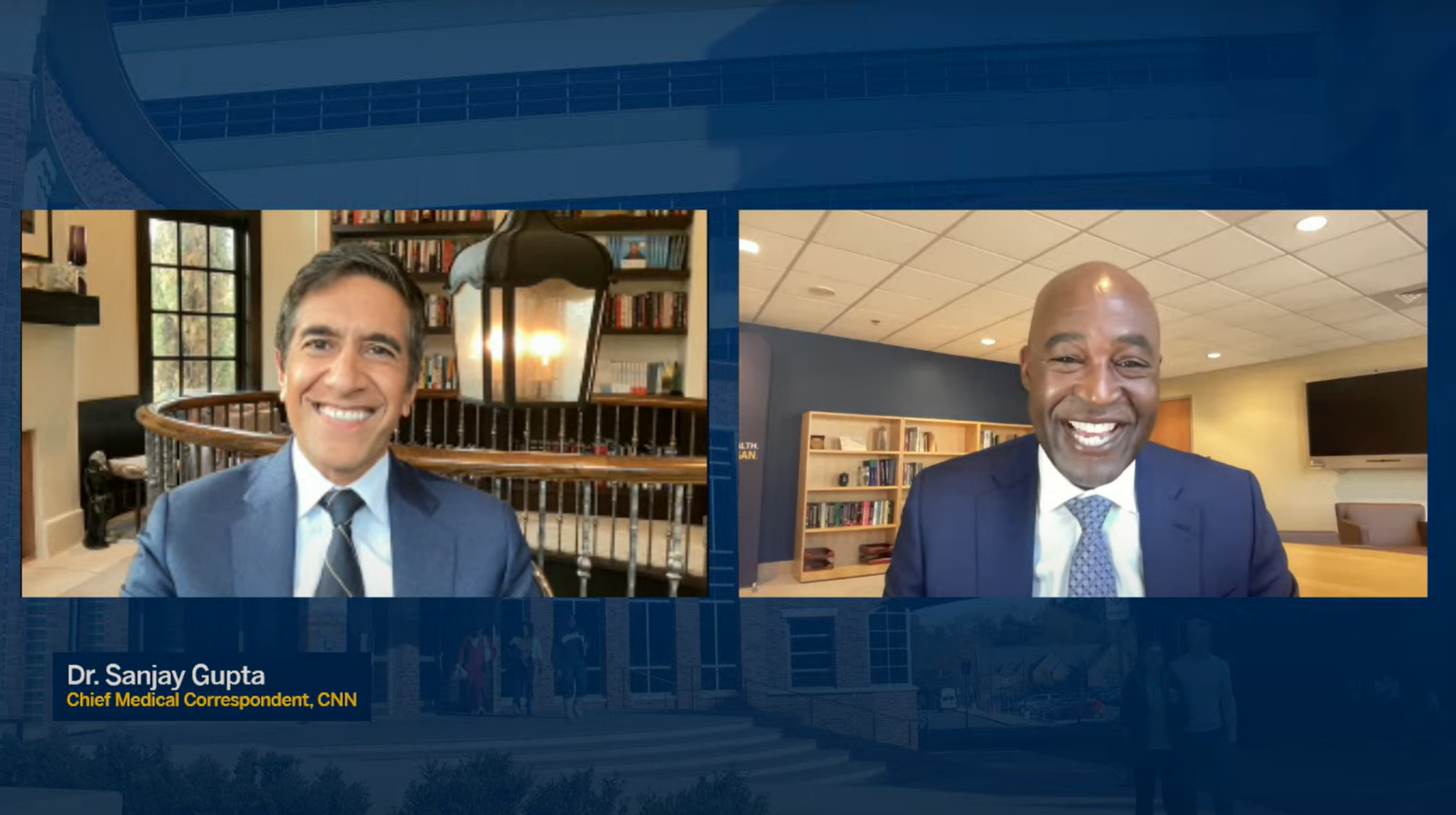
Patrick McGee: China’s Robots vs. America’s Chatbots
In his latest article for The Free Press, WWSG exclusive thought leader Patrick McGee argues that the global AI competition isn’t just about building the…
Thought Leader: Patrick McGee

Dr. Sanjay Gupta joined F. DuBois Bowman, dean of the School of Public Health at the University of Michigan, for the latest installment in the school’s “Ahead of the Curve” speaker series Wednesday afternoon. The livestreamed conversation featured discussions on the role Gupta has played in health and the media, with a specific focus on combating misinformation and building trust.
To kick off the event, Bowman described the mission of the speaker series, which seeks to highlight contemporary leaders in the health field. The series was started in November 2020 and has hosted seven speakers since then. Bowman said the School of Public Health hopes that hearing from industry leaders will inspire future generations of professionals at the University.
“Leadership is a critical component in navigating complex health challenges and building a better future to improve health inequity,” Bowman said. “We want to hear about the important factors that shape great leaders. We also want to learn about how they continue to evolve and grow. So that, in turn, we can think about how to best train the next generation of leaders.”
Throughout his global health work, Gupta has become a household name in the field of health communications as CNN’s chief medical correspondent, as well as a podcast host and author. The two-time U-M graduate is also a practicing neurosurgeon at Grady Memorial Hospital. On top of that, Gupta has found the time to win multiple Emmy awards and was named one of the sexiest men alive in 2003 by People magazine.
Cely Smart, chief of staff and Bowman’s strategic advisor, was another one of the lead organizers of the “Ahead of the Curve” series. In an interview with The Michigan Daily before the event, Smart said speakers are selected for the series based on their ability to share valuable messages with the U-M community.
“(Bowman) thinks (about) people that are leaders in public health,” Smart said. “So really, they can come from anywhere, but we’re looking for people who are dynamic leaders, and who have something that we think would be valuable to share.”
During his time in medical residency in the late ‘90s, Gupta said he developed an interest in global health care policy. Gupta said he didn’t feel as though health care workers were a large enough part of health care policy discussions at the time and he believed that needed to change.
“I started doing some writing around health care policy issues,” Gupta said. “I took a year during my neurosurgery training to go work as a White House fellow, where I primarily wrote and worked on the same issues the first lady (was working on) at that point —that was Hillary Clinton … When I started doing CNN work, I was going to be a commentator on health care policy issues.”
Gupta said there is a large overlap between the values shared between medicine and journalism. Both professions deal with individual human stories and lives, Gupta said.
“Journalists are all about telling stories and medical people and public health people are exposed to the greatest stories on Earth constantly,” Gupta said. “Sometimes you forget just how incredible the stories are. I think the journalism part of my life has reminded me of that.”
When asked about his experience building trust between the public and the media during the pandemic, Gupta said it was difficult as both a journalist and doctor to share definitive news when the situation was constantly changing.
“But I think no matter how the situation is changing, it’s (important to know) if it’s coming from a place of trust,” Gupta said.
Smart said Gupta has stayed connected to his U-M roots over the years. Most recently, Smart said Gupta helped choose the candidates for the Thomas Francis, Jr. Medal in Global Public Health this past summer. The Medal is presented to individuals who have made significant contributions to the advancement of global health.
“He’s given back to Michigan in several ways and over (the) years,” Smart said.
Bowman also recalled that the Gupta family sponsored a “hackathon” at the University in 2018, an innovation event aimed at developing new tools to improve health communications in partnership with the University’s Institute for Healthcare Policy and Innovation. Gupta said he was motivated to sponsor the event at his alma mater because he noticed that there were not a lot of programs dedicated to health journalism.
“There’s all sorts of different ways that people are communicating (about) health,” Gupta said. “It’s fascinating to me. I thought who better to teach me about all this than Michigan students … We’d like to continue doing that sort of stuff where, ideally, there is a health journalism field of study (that is) dedicated to public health (and) scientific communications.”
Patrick McGee: China’s Robots vs. America’s Chatbots
In his latest article for The Free Press, WWSG exclusive thought leader Patrick McGee argues that the global AI competition isn’t just about building the…
Thought Leader: Patrick McGee
John Kelly: The Impact of Veterans
10News Anchor John Becker sits down with Gen. John F. Kelly to chat about the impact of veterans and how they work to serve their…
Thought Leader: John Kelly
Erika Ayers Badan: How Great Teams Actually Work
On this episode of Unsolicited Advice, we talk about what actually makes teams work. How clarity beats charisma. Why initiative matters more than experience. Why…
Thought Leader: Erika Ayers Badan

